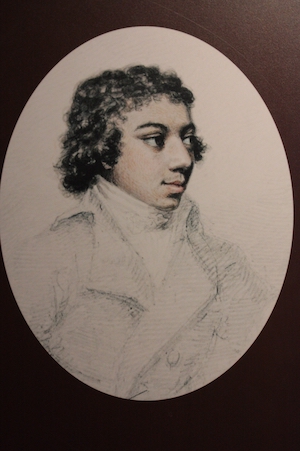by Jarrett Hoffman

•Today: Cleveland Orchestra plays The Magic Flute, No Exit concludes its Year of Surreality season with “Breaking the World,” Oberlin presents “The Grand Piano Extravaganza,” and M.U.S.i.C. puts on “Two Pianos and More”
•In the news: “an antiquated system in bad need of repair” — a look into the orchestral tenure process, including accusations that race played a role in the dismissal of former Kansas City Symphony principal percussion Josh Jones (pictured)
•Almanac: the strange story of Bridgetower, Beethoven, and the “Kreutzer” Sonata
HAPPENING TODAY:
At 7:00, you can hear Franz Welser-Möst and The Cleveland Orchestra perform Mozart’s The Magic Flute at Severance, or you can head to Praxis Fiber Arts for No Exit’s “Breaking the World” program, which concludes the ensemble’s season focused on Surreality. And at 8 at Oberlin Conservatory’s Warner Concert Hall, you can experience “The Grand Piano Extravaganza.” Note that today’s “Two Pianos and More!” program from M.U.S.i.C. – Stars in the Classics is sold out.
Details in our Concert Listings.
IN THE NEWS:
An article published in The Washington Post this morning covers the orchestral tenure process, particularly in the case of Josh Jones, former principal percussion of the Kansas City Symphony. Jones, who is Black, says that he was unjustly denied tenure, and that race played a role in his dismissal.
“Now, he has shared with The Washington Post the performance reviews, emails and texts that shed light on a typically confidential process,” Geoff Edgers writes. “Far beyond Kansas City, prominent musicians and supporters have seized upon his case. Jones, they say, stands for so many other promising young performers whose careers have been hobbled by an antiquated system in bad need of repair.”
Read the article here.
TODAY’S ALMANAC:

After being impressed by a young, star violinist — George Bridgetower (left) — Beethoven scrambled to write a new piece in time for them to perform it together at a concert on May 22, 1803. But when the piece wasn’t ready, the event had to be postponed until May 24.
The scrambling continued at 4:30 am on concert day, when Beethoven instructed one of his students to copy out the violin part of the first two movements. (The third, fortunately, had already been written out — discarded from the earlier Op. 31, No. 3 Sonata.)
But the student only finished half of what must have been an impossible and impossibly stressful job. So Bridgetower had to read the second movement from the composer’s manuscript.
From there, different versions of the story carry slightly different details, but what is agreed upon is that Bridgetower was sight-reading for at least a chunk of the premiere, that he impressed Beethoven with an inspired moment of improvisation, and that the performance was also very well-received, to boot.
It’s nice to imagine the two musicians, who had apparently hit it off from their first meeting, telling the story of the premiere for years to come, gathering in the warm company of friends reacting with spit takes and hanging jaws. Perhaps Beethoven and Bridgewater — B&B, their friends might call them — would tag-team the story: “You tell this part,” “No, you!”
None of that rosiness was to be. Apparently, after going out for an ill-fated drink together before Bridgetower left Vienna, the violinist spoke poorly of a woman whom Beethoven admired. The result? The removal of Bridgetower’s name from the dedication, and an everlasting sense of bitterness all around.
The irony is that the new dedicatee, Rodolphe Kreutzer, never ended up playing the piece. He didn’t even like it, describing it as “outrageously unintelligible.” And yet it is his name that, through this piece, has gone on to be spoken over and over through two centuries — though fortunately the name of George Bridgetower is becoming more widely known.

Joining them in the opening 14-part series is Akron-born poet and Pulitzer Prize winner Rita Dove (right) to discuss her book of poems Sonata Mulattica, which uses fact and fiction to tell the story of Bridgetower and to explore the nature of fame and of public memory. Click here to listen.



